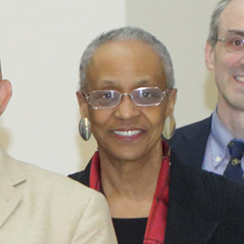Research
Kumanyika's research identified effective ways to reduce chronic diseases related to nutrition. Her efforts were focussed on achieving health equity for black Americans. [6] African Americans, Hispanics and American Indians are most severely impacted by obesity. [7] Kumanyika has studied the impact of obesity, salt-intake and other aspects of diet on human health. [6] She has always looked to embed cultural knowledge and sensitivities when implementing initiatives to reduce health disparities. [8] She joined the University of Pennsylvania in 1989 and was made a professor in 1993. She was a Senior Fellow in the University of Pennsylvania Leonard Davis Institute of Health Economics and the Institute on Aging. [8] She was a member of the 1995 and 2000 Dietary Guidelines Advisory Committee. [9] [10] In 1997 she published a comprehensive study of the possible adverse effects of sodium reduction. [11]
At the University of Pennsylvania she launched several weight loss trials, including TONE (Trials of Nonpharmacologic Intervention in the Elderly) and HOPE (Healthy Eating & Lifestyle Program). [5] TONE participants were recruited from Maryland, New Jersey, North Carolina and Tennessee, and was for people with a body mass index lower than 33 (37 for women). [5] HELP enrolled a more obese population, and was directed at fat and sodium reduction. [5] In 2002 she founded the African American Collaborative Obesity Research Network, AACORN. [12] AACORN is funded by a National Institutes of Health health disparities grant. [12] AACORN looks to improve the quality and quantity of research on weight related issues in African American communities, focussing on influencing policy, developing networks and translating research into practise. [13] AACORN have members across 20 states. [14] She directed the National Institutes of Health funded Project EXPORT, Excellence in Partnerships for Community Outreach, Research, and Training. [15]
She published the Handbook for Obesity Prevention with Springer Publishing in 2007. [7] The handbook provides information about how to prevent obesity, providing a set of solutions for a variety of audiences. [7] She produced an issue of Epidemiologic Review focused on obesity which collated articles covering what we do and do not know about obesity. [16] She became increasingly interested in population-wide approaches to prevent obesity, complementing clinical prevention. [17]
She has studied how racial and health disparities are presented in US newspapers, finding the largest disparities in HIV/AIDS, cardiovascular disease and cancer. [18] From 2008 to 2011 she was Vice Chair for the United States Department of Health and Human Services Secretary's Advisory Committee for Healthy Promotion and Disease Prevention. [19] In 2012 she was an expert of the HBO - National Academy of Medicine documentary Weight of the Nation. [20] The documentary reported that 20% of women's and 14% of men's cancer cases are caused by obesity. [20] In 2013 she wrote the World Innovation Summit for Health (WISH) foundation Obesity Report with Ara Darzi. [21] She became an emeritus professor at the Perelman School of Medicine at the University of Pennsylvania in 2014 and joined the Dornsife School at Drexel University as a research professor in 2015. [14]
This page is based on this
Wikipedia article Text is available under the
CC BY-SA 4.0 license; additional terms may apply.
Images, videos and audio are available under their respective licenses.
